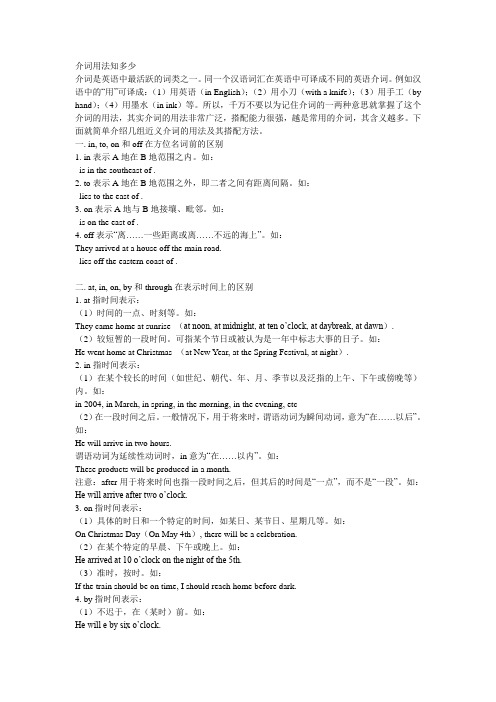与to、at、for、with连用的常见动词
介词in,on.at,for.with,by,of的基本用法

介词用法知多少介词是英语中最活跃的词类之一。
同一个汉语词汇在英语中可译成不同的英语介词。
例如汉语中的“用”可译成:(1)用英语(in English);(2)用小刀(with a knife);(3)用手工(by hand);(4)用墨水(in ink)等。
所以,千万不要以为记住介词的一两种意思就掌握了这个介词的用法,其实介词的用法非常广泛,搭配能力很强,越是常用的介词,其含义越多。
下面就简单介绍几组近义介词的用法及其搭配方法。
一. in, to, on和off在方位名词前的区别1. in表示A地在B地范围之内。
如:Taiwan is in the southeast of China.2. to表示A地在B地范围之外,即二者之间有距离间隔。
如:Japan lies to the east of China.3. on表示A地与B地接壤、毗邻。
如:North Korea is on the east of China.4. off表示“离……一些距离或离……不远的海上”。
如:They arrived at a house off the main road.New Zealand lies off the eastern coast of Australia.二. at, in, on, by和through在表示时间上的区别1. at指时间表示:(1)时间的一点、时刻等。
如:They came home at sunrise (at noon, at midnight, at ten o’clock, at daybreak, at dawn).(2)较短暂的一段时间。
可指某个节日或被认为是一年中标志大事的日子。
如:He went home at Christmas (at New Year, at the Spring Festival, at night).2. in指时间表示:(1)在某个较长的时间(如世纪、朝代、年、月、季节以及泛指的上午、下午或傍晚等)内。
英语核心词汇详解be good at for to with辨析

英语核心词汇详解be good at for to with辨析1、be good at (doing) sth.擅长于=do well in,后接技能、学科I am good at English,but Mary is good at maths.我擅长英语,但是玛丽擅长数学。
2、be good for ...对……有益与be bad for..(对......有害)是一对反义词be good for health 有益于健康Eating more vegetables is good for your health. 蔬菜对你的健康有好处。
Smokingis bad for your health. 吸烟对你的健康有害处。
3、be good with 对……有办法,善于应付……后接人或具体的事物,相当于get along withMary is good with old people. 玛丽和老人们相处的很好。
The new teacher is good with the children.新来的老师能和孩子们打成一片。
4、be good to 对…友好/有好处=be friendly toMy dad always says that we should be good to others.我爸爸总是说我们应该对别人友好。
三者都表示“参加”,区别如下:一、attend 指出席、参加较为正式的场合,如上课、讲座、报告、会议、婚礼等。
Tom has to attend lots of classes at weekends.汤姆周末要上很多课。
He did not attend the meeting yesterday.昨天他没有参加会议。
二、join 指加入某组织并成为其中一员。
固定搭配:join sb. in (doing) sth. 和某人一道做某事I will never forget the day when I joined the Party. 我永远也忘不了入党的那一天。
介词in,on.at,for.with,by,of的基本用法

介词用法知多少介词是英语中最活跃的词类之一。
同一个汉语词汇在英语中可译成不同的英语介词。
例如汉语中的“用”可译成:(1)用英语(in English);(2)用小刀(with a knife);(3)用手工(by hand);(4)用墨水(in ink)等。
所以,千万不要以为记住介词的一两种意思就掌握了这个介词的用法,其实介词的用法非常广泛,搭配能力很强,越是常用的介词,其含义越多。
下面就简单介绍几组近义介词的用法及其搭配方法。
一. in, to, on和off在方位名词前的区别1. in表示A地在B地范围之内。
如:is in the southeast of .2. to表示A地在B地范围之外,即二者之间有距离间隔。
如:lies to the east of .3. on表示A地与B地接壤、毗邻。
如:is on the east of .4. off表示“离……一些距离或离……不远的海上”。
如:They arrived at a house off the main road.lies off the eastern coast of .二. at, in, on, by和through在表示时间上的区别1. at指时间表示:(1)时间的一点、时刻等。
如:They came home at sunrise (at noon, at midnight, at ten o’clock, at daybreak, at dawn).(2)较短暂的一段时间。
可指某个节日或被认为是一年中标志大事的日子。
如:He went home at Christmas (at New Year, at the Spring Festival, at night).2. in指时间表示:(1)在某个较长的时间(如世纪、朝代、年、月、季节以及泛指的上午、下午或傍晚等)内。
如:in 2004, in March, in spring, in the morning, in the evening, etc(2)在一段时间之后。
新概念英语2_第46课_课后短语练习答案知识讲解

新概念英语2_第46课_课后短语练习答案新概念英语二 lesson46课后短语练习答案《新概念英语》第二册第46课第208页83个词组与 to, at, for和 with连用的动词与to连用的动词:accustom(ed) to(习惯于);amount to(达到);appeal to(呼吁);apply to /for(适用于);attach(ed) to(附属于);attend to(参加);belong to(属于);challenge to(向……提出挑战);compare to /with(比较);condemn(ed) to(判刑);confess to(承认);confine to(限制);consent to(同意);convert to(改信(某宗教));entitle(d) to(享有权利);listen to(听);mention to(提到);object to(反对); occur to(想到); prefer to(更喜欢);react to/against(对……反应);reply to(回答);respond to(响应);see to(注意);submit to(服从于);surrender to(向……投降);turn to(转向);yield to(屈服)。
e.g. I prefer listening to music to reading newspapers.Will you see to this flower while I’m away?我不在的时候你照看一下这花好吗?I shall see to the dinner tonight. 今晚我做晚饭。
与at连用的动词:amused at/by(对……感到有趣);arrive at/in(到达);astonish (ed) at/by(感到惊愕);exclaim at(惊叫);glance at(对……看一眼);guess at(猜测);knock at(敲);look at(看);point at/to(指向);shock(ed) at / by(感到震惊);stare at(盯着……看);surprise(d) at /by(感到惊讶);wonder at/about(感到惊异);work at/on(钻研)。
介词in,on.at,for.with,by,of的基本用法

介词是英语中最活跃的词类之一。
同一个汉语词汇在英语中可译成不同的英语介词。
例如汉语中的“用”可译成:(1)用英语(in English);(2)用小刀(with a knife);(3)用手工(by hand);(4)用墨水(in ink)等。
所以,千万不要以为记住介词的一两种意思就掌握了这个介词的用法,其实介词的用法非常广泛,搭配能力很强,越是常用的介词,其含义越多。
下面就简单介绍几组近义介词的用法及其搭配方法。
一. in, to, on和off在方位名词前的区别1. in表示A地在B地范围之内。
如:Taiwan is in the southeast of China.2. to表示A地在B地范围之外,即二者之间有距离间隔。
如:Japan lies to the east of China.3. on表示A地与B地接壤、毗邻。
如:North Korea is on the east of China.4. off表示“离……一些距离或离……不远的海上”。
如:They arrived at a house off the main road.New Zealand lies off the eastern coast of Australia.二. at, in, on, by和through在表示时间上的区别1. at指时间表示:(1)时间的一点、时刻等。
如:They came home at sunrise (at noon, at midnight, at ten o’clock, at daybreak, at dawn).(2)较短暂的一段时间。
可指某个节日或被认为是一年中标志大事的日子。
如:He went home at Christmas (at New Year, at the Spring Festival, at night). 2. in指时间表示:(1)在某个较长的时间(如世纪、朝代、年、月、季节以及泛指的上午、下午或傍晚等)内。
常见不及物动词搭配

一、接不定式(而不接动名词)作宾语的24个常用动词afford to do sth.负担得起做某事agree to do sth.同意做某事arrange to do sth.安排做某事ask todo sth.要求做某事beg to do sth.请求做某事care to do sth.想要做某事choose to do sth.决定做某事decide to do sth.决定做某事demand to do sth.要求做某事determine to do sth.决心做某事expect to do sth.期待做某事fear to do sth.害怕做某事help to do sth.帮助做某事hope to do sth.希望做某事learn to do sth.学习做某事manage to do sth.设法做某事offer to do sth.主动提出做某事plantodosth.计划做某事preparetodosth.准备做某事pretendtodosth.假装做某事promise to do sth.答应做某事refuse to do sth.拒绝做某事want to do sth.想要做某事wish to dosth.希望做某事注:有些不及物动词后习惯上也接不定式,不接动名词:aim to do sth.打算做某事fail to do sth.未能做某事long to do sth.渴望做某事happen to do sth.碰巧做某事hesitate to do sth.犹豫做某事struggle to do sth.努力做某事跟介词搭配的不及物动词count on依靠embark on上路gamble on以……打赌insist on坚持……rely on依靠theorize on对……推理,对……建立理论harp on老提到……calculate on指望,依靠concentrate on集中到……depend on依靠reckon on盼望,指望……account for说明,解释……answer for回答……apologize for为……道歉suffer for为……受苦pay for为……付钱look for寻找atone for补偿,赔偿make up for补偿stand for代表及物动词与不及物动词:在英语中按动词后可否直接跟宾语,可以把动词分成两种:及物动词与不及物动词。
新概念英语第二册Lesson70Redfordanger课文详解重点词汇语法语法填空讲义(1)

Lesson 70 文本Red for dangerDuring a bullfight, a drunk suddenly wandered into the middle of the ring. The crowd began to shout, but the drunk was unaware of the danger. The bull was busy with the matador at the time, but it suddenly caught sight of the drunk who was shouting rude remarks and waving a red cap. Apparently sensitive to criticism, the bull forgot all about the matador and charged at the drunk. The crowd suddenly grew quiet. The drunk, however, seemed quite sure of himself. When the bull got close to him, he clumsily stepped aside to let it pass. The crowd broke into cheers and the drunk bowed. By this time, however, three men had e into the ring and they quickly dragged the drunk to safety. Even the bull seemed to feel sorry for him, for it looked on sympathetically until the drunk was out of the way before once more turning its attention to the matador.文本解析一〕词汇学习Word study1. charge〔1〕vt., vi.要价,收费:They charged us too much for repairs.他们向我们要的修理费太多了。
新概念二册 46课,精心制作

1.unload v. 2.wooden adj. 3.extremely adv. 4.occur v. 5. astonish v. 6. pile n. 7. woollen n. 8. goods n. 9. dicover v. 10. admit v. 11. confine v. 12. normal adj. 1/20/2015
1/20/2015
Ask and answer
• • • • • • • 9.Where was the man lying ? 10.Why didn’t he try to run away ? 11.Was he arrested ? 12.When did he hide in the box ? 13.Had he had a comfortable trip ? 14.Why had it been an uncomfortable one ? 15.How much was he ordered to pay ?
2. No one could account for the fact that one of the boxes was very light.( F ) 3. A man was lying in the box on top of woollen goods.( T )
4.The man was ordered to pay £ 2,000! (F )
most comfortable way to travel?
least comfortable way to travel?
1/20/2015
A story for you :
1/20/2015
1/20/2015
- 1、下载文档前请自行甄别文档内容的完整性,平台不提供额外的编辑、内容补充、找答案等附加服务。
- 2、"仅部分预览"的文档,不可在线预览部分如存在完整性等问题,可反馈申请退款(可完整预览的文档不适用该条件!)。
- 3、如文档侵犯您的权益,请联系客服反馈,我们会尽快为您处理(人工客服工作时间:9:00-18:30)。
与t o、a t、f o r、w i t h连用的常见动词(总1页)
-CAL-FENGHAI.-(YICAI)-Company One1
-CAL-本页仅作为文档封面,使用请直接删除
与to连用的动词:
accustom(ed) to(习惯于);amount to(达到);appeal to(呼吁);apply to /for(适用于);attach(ed) to(附属于);attend to(参加);belong to (属于);challenge to(向……提出挑战);compare to /with(比较);condemn(ed) to(判刑);confess to(承认);confine to(限制);consent to(同意);convert to(改信(某宗教));entitle(d) to(享有权利);listen to (听);mention to(提到);object to(反对); occur to(想到); prefer to(更喜欢);react to /against(对……反应);reply to(回答);respond to (响应);see to(注意);submit to(服从于); surrender to(向……投降);turn to(转向);yield to(屈服)。
1、 I prefer listening to music to reading newspapers.
2、 Will you see to this flower while I’m away我不在的时候你照看一下这花好吗
3、 I shall see to the dinner tonight今晚我做晚饭。
与at连用的动词:
amused at/by(对……感到有趣);arrive at/in(到达);astonish (ed) at/ by (感到惊愕);exclaim at(惊叫);glance at(对……看一眼);guess at(猜测);knock at(敲);look at(看);point at/to(指向);shock(ed) at / by (感到震惊);stare at(盯着……看);surprise(d) at /by(感到惊讶);wonder at/about(感到惊异);work at/on(钻研)。
at通常用于表达感情的一些词之后,并且这些词往往用被动语态,at用于其它动词之后一般为主动语态。
1、 He was astonished at what he found.
2、 Dan was both surprised and amused at the news.
与 for连用的动词:
account for(说明(原因));ask for/of(请求);act for/on(代表);apologize for(因……而道歉);blame for(责备);beg for(乞求);call for (需要);charge for(收费);exchange for(交换);hope for(希望);look for(寻找);mistake for(误认为);mourn for(哀悼);pay for (为……付款);prepare for(准备);provide for(提供);search for(寻求);thank for(感谢);vote for/on 投票支持;wait for/on(等候)。
1、 He was searched for the stolen money.
2、Can you account for his strange behavious
与with连用的动词:
agree with(同意);begin with(以……开始);communicate with(与……联络);compare with/to(与……比较);compete with/against(同……竞争);comply with(同意;confuse with(误作);contrast with/to(形成对照);
cope with(对付);correspond with(与……一致);disgust(ed) with(使……讨厌);finish with(完成);help with/ in(帮助);interfere with/in(干扰);mix with(混合);occupy(ied) with(从事于);part with(放弃);please(d) with(对……满意);quarrel with/about(争论);reason with(规劝);satisfy (fied) with/by(感到满足);threaten (ed) with(威胁)。
1、I’m pleased with this room.
2、Sam used to mix with those people.萨姆过去常与那些人交往。
3、We’ll begin with the exercises.我们从练习开始。
